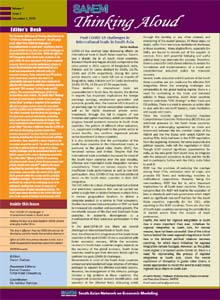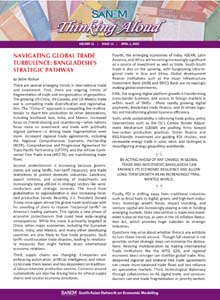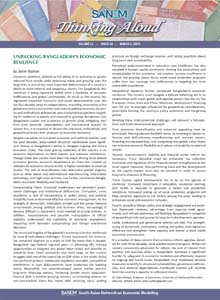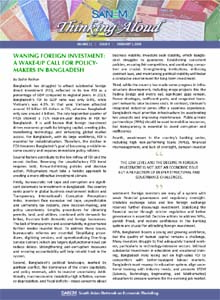
Thinking Aloud: Volume VII, Issue 7: December 2020
 The December 2020 issue of Thinking Aloud focuses on “COVID-19: Challenges and Wayout”. The first page article titled “Post COVID-19 challenges in international trade in South Asia” emphasizes that In the post-COVID-19 era, there are several challenges in international trade in South Asia. While the effective GVC integration of the South Asian countries in the post-COVID-19 era is associated with faster economic recovery, there is a need for institutional reforms to ensure the formulation and implementation of a broad and comprehensive industrial policy for economic recovery. Trade, industrial and FDI policies of the South Asian countries also need to be substantially reformed to make them conducive for effective GVC integration, and these countries need to undertake “GVC strategy” in their trade and FDI policies. The second and third pages of this issue present three more articles. The article titled “Making the best of a bad situation: COVID-19 and emerging market firms” provides a snapshot of ten pandemic affected emerging markets where the immediate reactions of firms were stakeholder-centric in nature. The article concludes that the firms are focusing on the short-term needs of stakeholders, protecting labour and long-term relationships for longer-term value maximisation above shorter-term gains. The article titled “This time is different: How the COVID-19 crisis has hit developing countries harder than previous downturns” narrates how the containment measures, including the closure of economic activities and borders, have resulted in a severe impact on the economies around the world. The article reiterates the necessity to address both the longer-term labour market challenges and the exacerbated decent work deficits caused by the crisis in developing economies. The article titled “Effects of COVID-19 on primary education in India: Does it divide the government and private schools more sharply?” explores the issues being faced by countries with a low technology penetration, such as India, the extent of the digital divide present within the society and the probable mitigation strategies. The article stresses that the pandemic has exposed the underlying issues to be addressed, starting from access to resources to implementation of better educational policies. The fourth page draws attention to the events that took place in the month of October and November 2020.
The December 2020 issue of Thinking Aloud focuses on “COVID-19: Challenges and Wayout”. The first page article titled “Post COVID-19 challenges in international trade in South Asia” emphasizes that In the post-COVID-19 era, there are several challenges in international trade in South Asia. While the effective GVC integration of the South Asian countries in the post-COVID-19 era is associated with faster economic recovery, there is a need for institutional reforms to ensure the formulation and implementation of a broad and comprehensive industrial policy for economic recovery. Trade, industrial and FDI policies of the South Asian countries also need to be substantially reformed to make them conducive for effective GVC integration, and these countries need to undertake “GVC strategy” in their trade and FDI policies. The second and third pages of this issue present three more articles. The article titled “Making the best of a bad situation: COVID-19 and emerging market firms” provides a snapshot of ten pandemic affected emerging markets where the immediate reactions of firms were stakeholder-centric in nature. The article concludes that the firms are focusing on the short-term needs of stakeholders, protecting labour and long-term relationships for longer-term value maximisation above shorter-term gains. The article titled “This time is different: How the COVID-19 crisis has hit developing countries harder than previous downturns” narrates how the containment measures, including the closure of economic activities and borders, have resulted in a severe impact on the economies around the world. The article reiterates the necessity to address both the longer-term labour market challenges and the exacerbated decent work deficits caused by the crisis in developing economies. The article titled “Effects of COVID-19 on primary education in India: Does it divide the government and private schools more sharply?” explores the issues being faced by countries with a low technology penetration, such as India, the extent of the digital divide present within the society and the probable mitigation strategies. The article stresses that the pandemic has exposed the underlying issues to be addressed, starting from access to resources to implementation of better educational policies. The fourth page draws attention to the events that took place in the month of October and November 2020.



